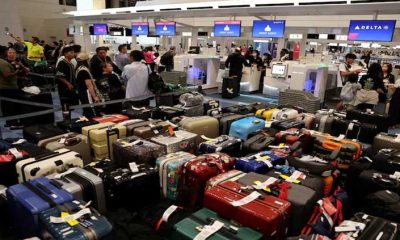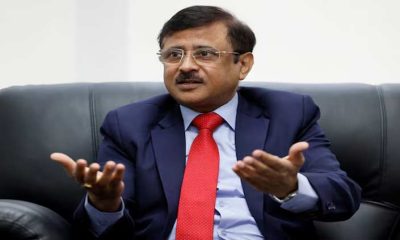Voters remain largely divided over whether they prefer Republican Donald Trump or Democrat Kamala Harris to handle key economic issues, although Harris earns slightly better marks on elements such as taxes for the middle class, according to a new poll.
A majority of registered voters in the survey by The Associated Press-NORC Center for Public Affairs Research describe the economy as poor. About 7 in 10 say the nation is going in the wrong direction.
But the findings reaffirm that Trump has lost what had been an advantage on the economy, which many voters say is the most important issue this election season above abortion, immigration, crime and foreign affairs.
“Do I trust Trump on the economy? No. I trust that he’ll give tax cuts to his buddies like Elon Musk,” said poll respondent Janice Tosto, a 59-year-old Philadelphia woman and self-described independent.
An AP-NORC poll conducted in September found neither Harris nor Trump had a clear advantage on handling “the economy and jobs.” But this poll asked more specific questions about whether voters trusted Trump or Harris to do a better job handling the cost of housing, jobs and unemployment, taxes on the middle class, the cost of groceries and gas, and tariffs.
The poll found that 46% of voters prefer Harris on middle-class taxes, compared to 35% for Trump. Harris also has a slight advantage on the cost of housing. Voters are about evenly divided on whether Trump or Harris is better on prices for everyday essentials like groceries and gas, and neither candidate has an edge on jobs and unemployment.
Voters, meanwhile, are slightly more likely to prefer Trump on the issue of tariffs, which were defined in the poll as taxes on imported goods.
Poll respondent Amber Moody, 36, from Halifax, Virginia, said she trusts Trump — and Republicans in general — much more on economic matters.
“It seems to me that in my lifetime, every time a Democrat holds office, the economy suffers,” she said. “Prices go up, taxes go up and the national debt goes up. While I don’t approve of everything Donald Trump says and does, I do believe he is the better choice.”
Voters see Harris more favorably than Trump
Voters’ impressions of Harris and Trump have remained steady over the last month.
About half of voters have a very or somewhat favorable opinion of Harris, while 46% see her unfavorably. Meanwhile, about 4 in 10 voters have a positive view of Trump and about 6 in 10 have an unfavorable view. Trump’s favorability ratings have been remarkably consistent over the last few months, even after two assassination attempts and a felony conviction.
Compared to last month, views of the candidates are stable among Black and Hispanic voters, as well as among men and women. Black voters’ views of Harris are overwhelmingly positive — about three-quarters have a favorable view of the Democratic candidate — and their views of Trump are negative, with about 2 in 10 holding a favorable view. Hispanic voters also view Harris more favorably than Trump, although the gap is narrower: About 6 in 10 Hispanic voters have a favorable view of Harris and about 4 in 10 have an favorable view of Trump.
The poll also shows a gender gap in views of the candidates heading into the final days of the election.
Overall, voters remain pessimistic about the state of the economy and the general direction of the country.
About half of voters describe the nation’s economy as very or somewhat poor. Republicans and independents are more likely than Democrats to express that view. There are modest signs of improvement, however, compared to an AP-NORC poll from October 2023, when about 7 in 10 U.S. adults thought the U.S. economy was in bad shape. The number was even worse in October 2022, when close to 8 in 10 Americans described the economy as poor.
About two-thirds of voters also say the country is headed in the wrong direction, while roughly one-third say things are moving in the right direction. Pessimism on that question has been fairly consistent over the last three years, although closer to 8 in 10 Americans thought the U.S. was heading in the wrong direction a year ago. U.S. adults were similarly gloomy just before the last presidential election, according to an AP-NORC poll from October 2020 when roughly 7 in 10 Americans felt the country was headed in the wrong direction.
Jeffrey Trimble, a 62-year-old Democrat from Hermitage, Pennsylvania, said he’s increasingly optimistic about the direction of the nation after “four years of hell” during Trump’s first term.
“We have some really good people at the top of our government who have a vision, they’re kind, they’re trying to get us back on track,” Trimble said.
Overall, the new poll highlights signs of trouble for both candidates as they work to assemble winning coalitions.
Younger voters are considerably more pessimistic about the health of the economy than older voters, and that’s not good news for Harris, whose party has long relied on strong support from voters of color and young people.
Voters under the age of 45 are also slightly less likely than voters over 45 to trust Harris to handle the cost of housing or the cost of groceries and gas, although that doesn’t mean they prefer Trump. Sizable shares of younger voters — about one-quarter on both issues — trust neither candidate or both equally.
Trump’s strongest issue remains immigration
On other issues, meanwhile, Trump’s most consistent advantage continues to be immigration.
Forty-five percent of voters say he’s the better candidate to handle immigration issues, compared to about 4 in 10 who prefer Harris. About half of white voters trust Trump more on the issue of immigration, while about one-third say this about Harris. Hispanic voters are split on which candidate they prefer to handle immigration.
Harris’ strongest issues are abortion policy, with about half of voters saying she’d be better on that issue compared to about 3 in 10 for Trump; climate change, where about half prefer her leadership and about 2 in 10 prefer Trump’s; and election integrity, where about half prefer Harris and about 3 in 10 prefer Trump.
The candidates are about even on the issue of crime. Foreign policy is also a key issue this fall, although neither candidate has a clear advantage on the situation in the Middle East. There are some signs of weakness on the issue for Harris within her own party, however. Only about two-thirds of Democratic voters say Harris would be the better candidate to handle the situation in the Middle East. Among Republicans, about 8 in 10 say Trump would be better.
Diana Campbell Williams, a 72-year-old Democrat who lives in Auburn, Michigan, cites foreign affairs as her top issue.
She says she’s concerned about Russia, Iran and North Korea. She doesn’t like Trump’s questioning of NATO and his relationship with Russian President Vladimir Putin.
“I trust Harris more,” Williams said. “I feel she knows more about what’s going on, and I prefer the type of people she’d be surrounded by after the election.”
Post Views: 4

 pakistan3 months ago
pakistan3 months ago
 Tech3 months ago
Tech3 months ago
 World3 months ago
World3 months ago
 Business3 months ago
Business3 months ago
 Entertainment3 months ago
Entertainment3 months ago
 Tech3 months ago
Tech3 months ago
 Entertainment3 months ago
Entertainment3 months ago
 Business3 months ago
Business3 months ago





















